New UArizona Climate Change and Health Center Brings Together Many Stakeholders for Launch Meeting
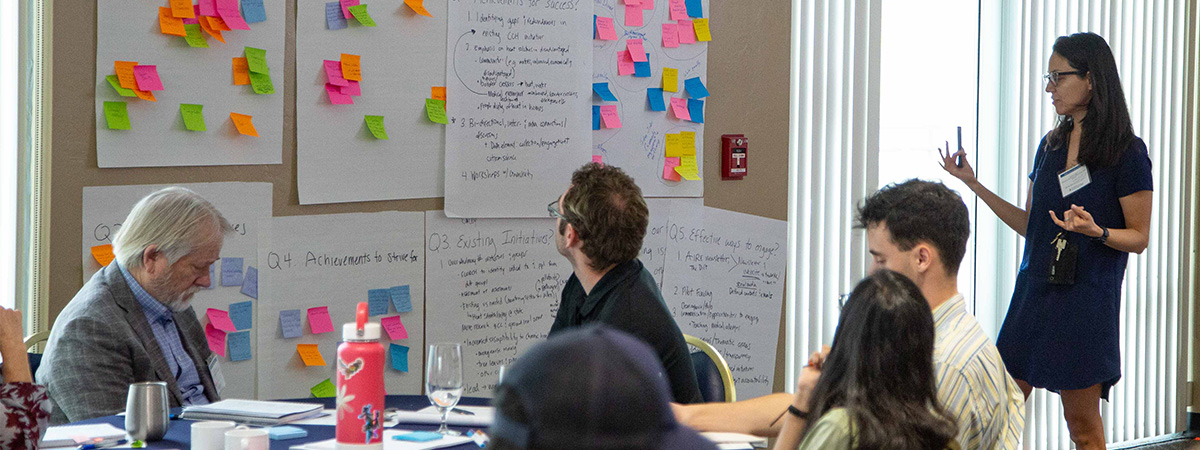
The kickoff planning meeting for the UArizona’s new NIH funded Southwest Center on Resilience for Climate Change and Health brought together a multidisciplinary group of experts from across the university, government agencies, and community groups to focus on health threats and solutions related to climate change.
Tucson, Arizona – The kickoff planning meeting for the University of Arizona’s new Southwest Center on Resilience for Climate Change and Health (SCORCH) in the Zuckerman College of Public Health, brought together a multidisciplinary group of experts from the UArizona, regional government agencies, and community non-profit groups to focus on a collaborative approach to health threats and solutions related to climate change.
Funded by the National Institute of Environmental Health Sciences (NIEHS) at the National Institutes of Health (NIH), SCORCH will build research knowledge and practice to benefit communities regionally, nationally, and globally as climate extremes increase. Hotter and drier climate conditions are driving a range of health challenges for more than 2 billion people who live in arid lands, here in Arizona and around the world. SCORCH is dedicated to research and programs that will empower communities in dry regions, both locally and globally, to adapt to the health risks of climate change and to build health equity as heat, drought, wildfires, and other climate crises threaten population health.
The meeting, on Monday, February 26, 2024, included representatives from the City of Tucson, Pima County, and the Arizona Department of Health Services (ADHS). SCORCH leadership convened both the Internal Advisory Board (IAB) and Community Advisory Board (CAB) for the Center at the inaugural session. After a blessing by Dr. Carlos Gonzalez, the meeting began with a welcome and introduction from Kacey Ernst, PhD, MPH, one of three Multiple Principal Investigators (mPI) for the new Center and professor in the Zuckerman College of Public Health (COPH).
“Our aim with this center is to work collectively to identify real-world solutions to the increasing health threats posed by climate change,” said Dr. Ernst, “The diversity of experience and expertise brought together during our planning meeting is essential, and we look forward to growing involvement across campus and the community. If people are interested in this initiative, they should reach out to me, Joe, or Mona.”
Next, the Center’s three ‘Program Cores’ were presented by the Core Leads. Dr. Kacey Ernst introduced the Administration Core, Multiple Principal Investigator Mona Arora, PhD, MsPH, assistant research professor in COPH introduced the Community Engagement Core, and Multiple Principal Investigator Joe Hoover, PhD, assistant professor in the Department of Environmental Science in the College of Agriculture, Life & Environmental Science (CALES), introduced the Integrated Data Visualization Core.
SCORCH research projects were presented next, including a presentation from Co-Investigator Shujuan Li, PhD, associate professor in the College of Architecture, Planning, and Landscape Architecture (CAPLA) who leads Research Project 1: Greenspace to build resilience to climate change impacts on health: The good, the bad, and the future, and a presentation from Co-Investigator Melissa Furlong, PhD, assistant professor in COPH, who leads Research Project 2: Heat Waves during Pregnancy, Neurodevelopment, and Resiliency.
Following the presentations, four working groups, composed of both Internal Advisory Board and Community Advisory Board members, met to brainstorm challenges and solutions.
“For me, the main take-away from this meeting was the critical need for more resources and research to address emerging climate-related health challenges and inform policy discussions that will increase community resilience to improve health and well-being,” said Dr. Joe Hoover.
The Internal Advisory Board (IAB) is made up of key SCORCH disciplines that contribute the range of expertise needed to carry out the mission of solutions-driven research and community engagement. Key UArizona researchers representing several UArizona colleges, centers, and programs contribute to the planning and success of the SCORCH in these areas.
The IAB was represented by the following participants at the planning meeting:
- Nathan Cherrington, PhD, ATS, Southwest Environmental Health Science Center
- Greg Collins, PhD, MPH, Arizona Institute for Resilience
- Dan Derksen, MD, Arizona Center for Rural Health
- Dan Ferguson, PhD, MA, Climate Assessment for the Southwest (CLIMAS)
- Kathy Jacobs, MLA, Center for Climate Adaptation Science and Solutions
- Julia Jernberg, MD, College of Medicine Tucson
- Ellen Mcmahon, MS, MFA, College of Fine Art
- Armin Sorooshian, PhD, Climate Dynamics and Hydrometeorology Collaborative (CDHC)
- Frank von Hippel, PhD, One Health Initiative, UArizona Health Sciences
- Michelle Walsh, PhD, Norton School of Human Ecology, Cooperative Extension
Sharon Collinge, PhD, MS, Director of the UArizona’s Arizona Institute for Resilience is also a member of the IAB but she was unable to attend the meeting.
The Community Advisory Board (CAB) consists of non-academic, community, and practice partners external to the University of Arizona. Members represent diverse community groups, including Indigenous, Latinx, and rural populations, as well as local and regional agencies from different sectors.
The Community Advisory Board informs the development of guiding principles and work plans to guide equitable community engagement programs. They also provide input and advice on research directions, including identification of additional Research Focus Groups and pilot projects and review data visualization products. The Community Advisory Board will ensure that SCORCH can translate research findings in a culturally appropriate way for rural, urban, tribal, underserved, and under-resourced communities.
The CAB was represented by the following:
- Stephen Addison, MPA, ISA, City of Tucson
- Jennifer Botsford, MSPH, ADHS Office of Environmental Health
- Kat Davis, MPH, Pima County Health Department
- Tom Dang, National Weather Service
- Fátima Luna, City of Tucson
- Tashina Machain, MPH, Arizona Advisory Council on Indian Healthcare
- Jon Meyers, Arizona Developmental Disabilities Planning Council
- Natalie Shepp, Pima County Dept. of Environmental Quality
Following lively discussion among the four working groups, the Center’s IAB and CAB groups formulated a path forward. The plan will bring together transdisciplinary research groups to conduct solutions-oriented team-science projects responsive to the health needs of arid lands communities adapting to climate change.
“Our kickoff planning meeting brought together so many people who have been working on climate-driven health challenges from different angles,” said Dr. Mona Arora, “It was so valuable to bring all that knowledge together, and exiting that we are working towards a common goal to make communities more resilient as climate extremes impact people’s lives. I’m proud and inspired to be working with this group!”
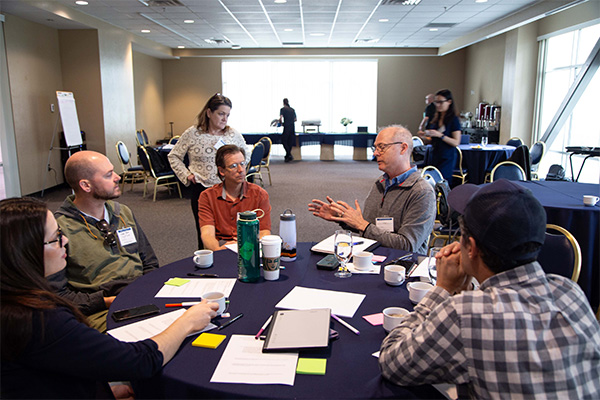
One of Four workgroups in the morning session: Left to right: Fatima Luna, Chief Resiliency Officer, City of Tucson, Stephen Addison, City of Tucson, Laura Schweers, (standing) CRH & SCORCH, Dan Ferguson, CLIMAS, Jon Meyers, Arizona Developmental Disabilities Planning Council, Armin Sorooshian, Climate Dynamics and Hydrometeorology Collaborative (CDHC) (in cap)
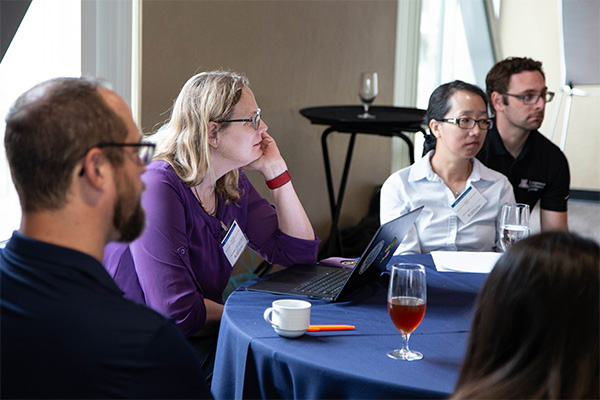
Left to right: Ladd Keith, CAPLA, mPI Kacey Ernst MEZCOPH, Shujuan Li, CAPLA, mPI Joe Hoover, CALES listen during the IAB round-table discussion
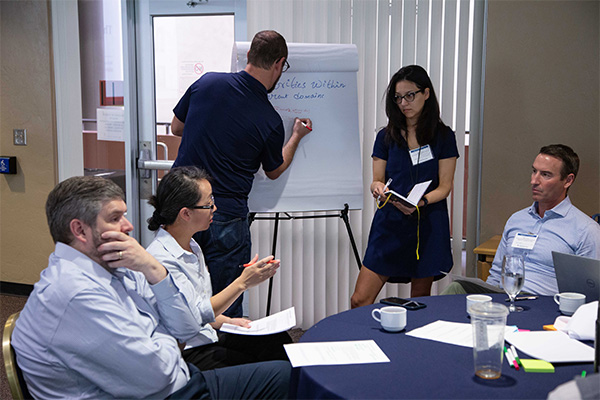
Small working group from the morning session: Left to right: Nate Cherrington, Southwest Environmental Health Science Center, Shujuan Li, PhD, CAPLA , Ladd Keith, CAPLA, Melissa Furlong, PhD, SCORCH, Greg Collins, Resilience & International Development, Research, Innovation & Impact
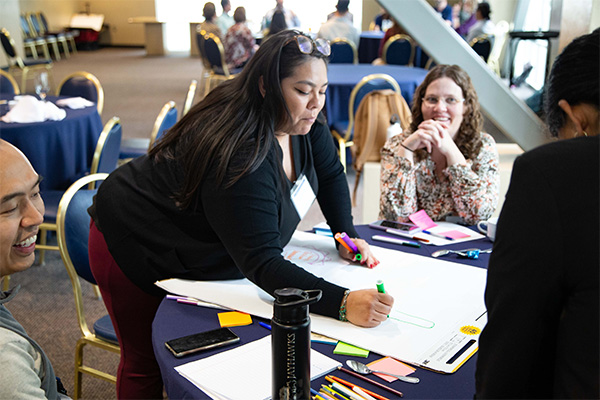
CAB afternoon workgroups: Left to right: Tom Deng, National Weather Service, Tashina Machain, Arizona Advisory Council on Indian Healthcare, Jennifer Botsford, ADHS Office of Environmental Health
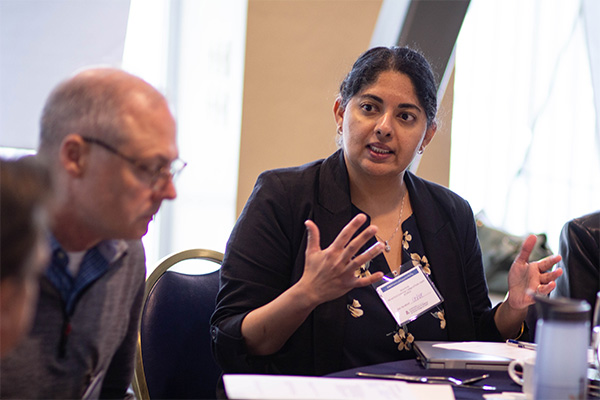
mPI Dr. Mona Arora in small-group discussions with Jon Meyers, Arizona Developmental Disabilities Planning Council.
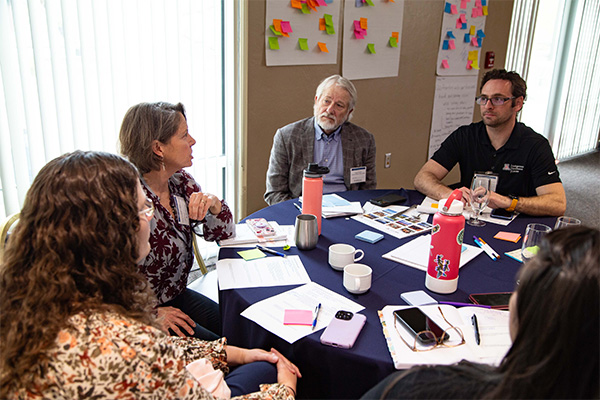
Morning workgroup session with (left to right) Jennifer Botsford, AHDS Office of Environmental Health, Michelle Walsh, Family, Consumer & Health Sciences, Cooperative Extension, Dr. Dan Derksen, Arizona Center for Rural Health, Joe Hoover, mPI SCORCH & CALES, with Tashina Machain, Advisory Council on Indian Healthcare, in the foreground.

